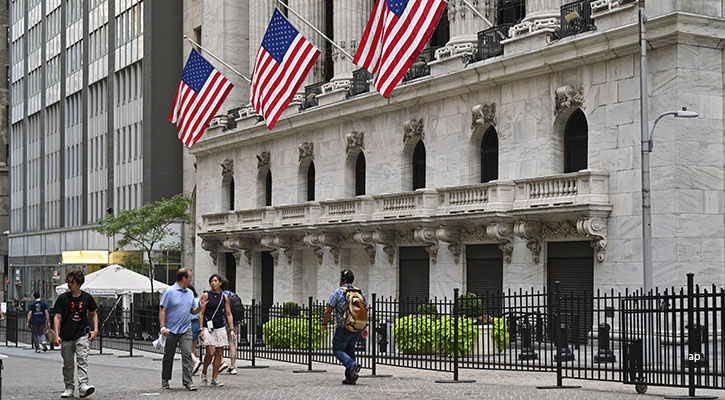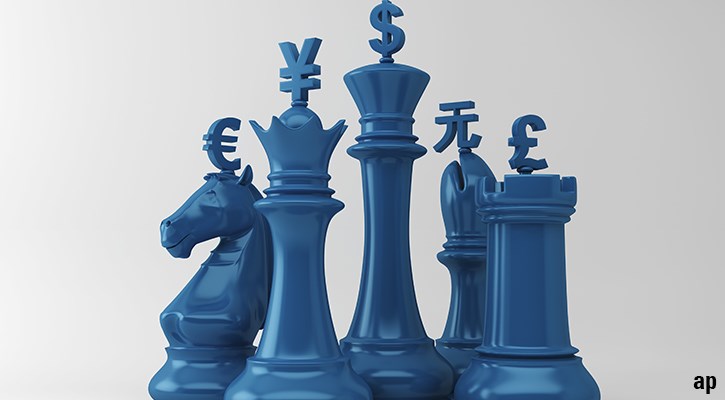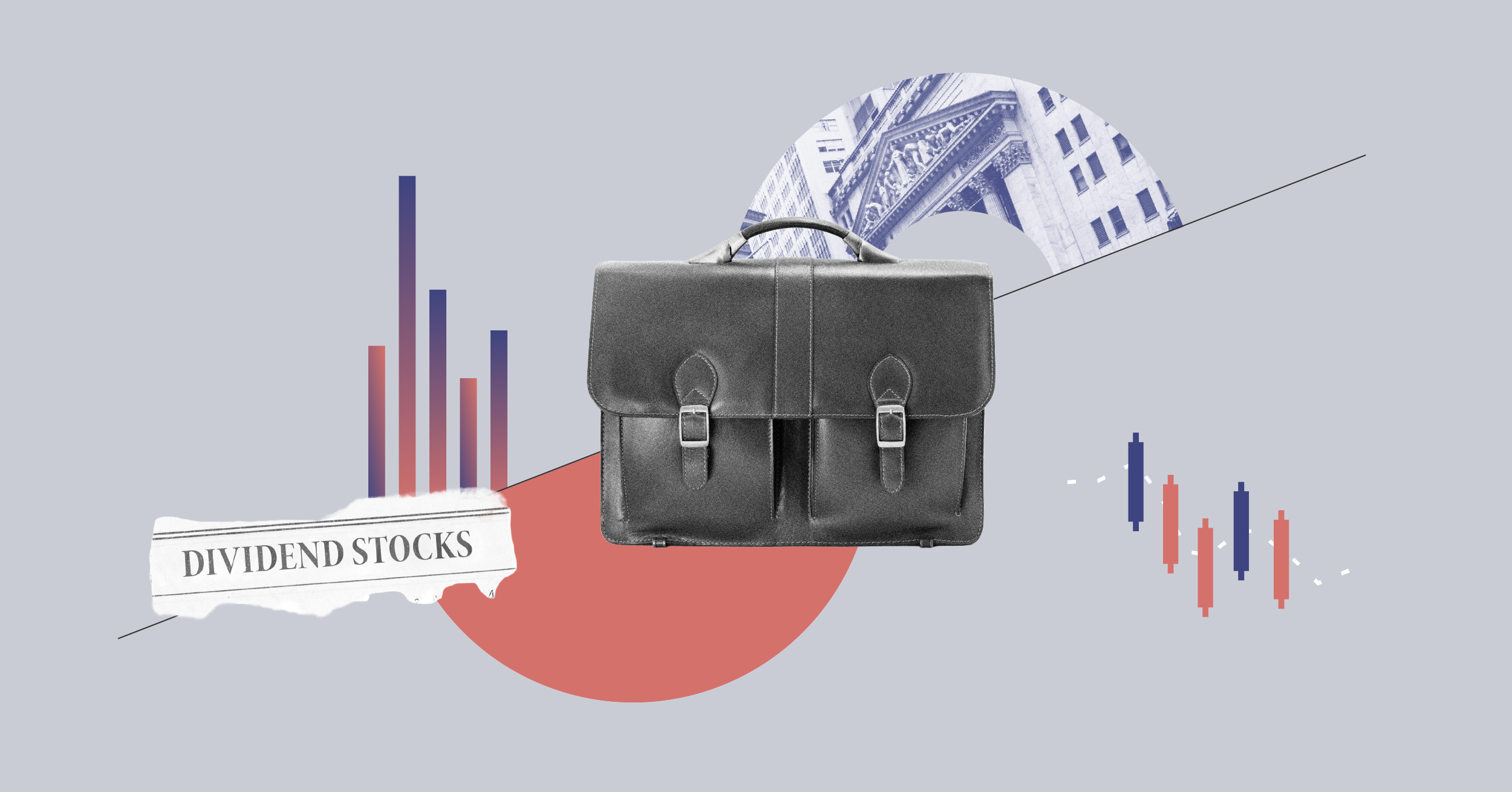
Nearly four years ago then-Bank of England governor Mark Carney said the pound was behaving like an emerging market currency. This wasn’t a compliment, of course. He meant sterling was skittish and prone to sudden losses of confidence. And it wasn't a one-off. Last autumn the pound had another more serious crisis, briefly nearing parity with the dollar.
What these episodes illustrate is, among other things, the primacy of the dollar. It is, after all, the world’s main reserve currency, a symbol of America’s economic might, and a useful reference point for commodity, currency and stock investors worldwide. When things turn sour economically, investors turn to the dollar (and yen and Swiss franc) for comfort.
If you work in the US, you get paid in dollars, you save in dollars, and you invest in dollars. America’s political heft in world affairs might not really bother you, but you own a currency that's strong. Or is it? Experts have been writing off the dollar for many a year now, and one day they may just be right. What's more, there is now evidence some emerging market countries are starting to make plans that sidestep the famous greenback.
Behold: De-Dollarisation
Dollar bashing is now so fashionable there's a word for it: de-dollarisation.
"Everyone is looking for evidence the USD is becoming less important (there is some, sort of, at the margin)," said commentator Dario Perkins on X (formerly Twitter) recently.
Indeed, one of the items on the agenda at August's BRICS summit in Johannesburg was to reduce dependence on the US dollar via a "New Development Bank" based in China. If you want an idea of this event's global credibility, Vladimir Putin himself gave a keynote, albeit via videolink.
The list of emerging markets that have crashed against the dollar is long. These aren’t temporary crashes either. They show a complete mauling of EM currency by the US dollar: the South African rand, Turkish lira, Brazil’s real and even the Argentine peso have had near-death experiences: the US dollar bought you 3 Argentine pesos in 2003. Now it buys 350.
Clearly something has broken, at least from the perspective of the emerging markets, which undertstandably have had enough of the beatings. Banding together with China is one approach. One lone contrarian voice is Argentina’s presidential candidate Javier Milei, who wants to ditch the peso and make the US dollar the country’s currency. The peso has naturally cratered on his plans. Is that the future for EM currencies?
This approach may seem pragmatic. Being less dependent on what the Fed does next may be even a positive step for these countries. But the US should take note of these moves, especially with middle eastern countries starting to flex their financial muscles.
A recent example is India, which paid for crude oil from the UAE using local currency rather than the US dollar. For context, India has been buying cheap Russian oil the West can’t buy because of sanctions. So these are not just financial decisions, they are active subversions of the mainstream (and US-centric) worldview. Likewise, Turkey, which has sold arms to Ukraine, enticed Russian exiles, and brokered the grain deal between the two countries – has somehow managed to keep its peace with the US.
Resource-hungry countries needing to buy commodities have previously just had to pay up. Now they are starting to bypass the upfront cost of buying dollar-denominated materials and the transaction costs.
On the other side, commodity-producing countries have benefited from the stronger dollar. As Japan is discovering this year, a weaker currency can help exports. And EM countries get paid in dollars for natural resources, boosting their precious pool of foreign currency reserves.
Countries can also peg their currencies to the dollar too, such as Hong Kong and Saudi Arabia. Maintaining the peg can avert outright collapses, but can be hugely costly for countries as they have to buy local currency to support the exchange rate. This can often become a self-defeating doom loop.
Debt And The Dollar
Another impact of this anti-dollar mission will be felt in emerging market debt. One development of the post-Cold War era has been the opening up of debt markets to foreign investors. China, a country where leaders have more or less absolute power over the country, has marketed its sovereign debt and it’s proved popular. The economy has been well run – at least for an EM – and it has offered decent yields.
For yield-starved Western investors, this seemed like a decent quid pro quo; EM countries commanded a premium because of their status but had a lower risk of default. So EM nations got vital dollar inflows, and the rich world got some chunky yields. Here’s where dollar dependency really hits home: if you have a local currency crisis you still have to meet your dollar obligations, and this process can be expensive. Brutally expensive.
EM countries have pegged their currencies to the dollar in the past. Many still do. There's a vast academic literature about this, which is outside the scope of this article, but it is a fascinating topic.
A recent example of a dollar default is in Chinese property developer Evergrande, which defaulted on its debt in 2021. While EM governments don’t ordinarily default, it can happen. Credit rating agencies hold a lot of power in the world of EM, so in theory would-be debt investors have credible information about the likelihood of default. Now that the West has higher interest rates, debt investors don’t necessarily need to travel as far for yield: a two-year US Treasury bond pays just over 5%. Go figure.
China is a fascinating case study of an EM's changing relationship with the dollar. As its economy opened up to the outside world and exchange controls were lifted, a new paradigm emerged. Pegged to the US dollar until 2005, the yuan was devalued to keep the country's exports competitive. This arrangement worked for a number of years as the US bought cheap Chinese goods made with cheap labour, and China's economy boomed.
In 2016 the Chinese yuan joined the list of "reserve" currencies and is one of the most traded in the world. (London remains the biggest market share for offshore yuan trading).
But predictions that it will overtake the US dollar have fallen short, as this FT chart clumsily shows. Beijing has recently intervened to prop up the ailing yuan as the economy falters amid deflation fears.
Currency Risk
What about equity investors? As a UK or European investor you don’t have a friction-free experience if you want exposure to EM, because most emerging funds are priced in dollars. There are three currencies involved in this transation when I buy fund units: the pound/euro, the dollar, and the EM currency the stocks are priced in.
While the pound is having a small revival this year, a weak currency can actually flatter performance figures in the short term, as this article explains. I can always buy this fund in sterling (or euros, or yen) or buy a hedged version.
On that theme, it's worth keeping an eye on performance figures. Sometimes they are quoted in local currency and other times in US dollars. These can be very different, especially if there has been a big move in the currency pair that year. The return may look amazing in one but less so in others, and the currency effect may be the swing factor.
In 2016 The Economist ran a front page entitled The Mighty Dollar. That feels like a long time ago now. Whether its hegemony continues in the guise we have come to know is uncertain. But exchange rates will always be an absolutely essential part of EM investing, and investing generally. You can bet your bottom dollar on that.





























